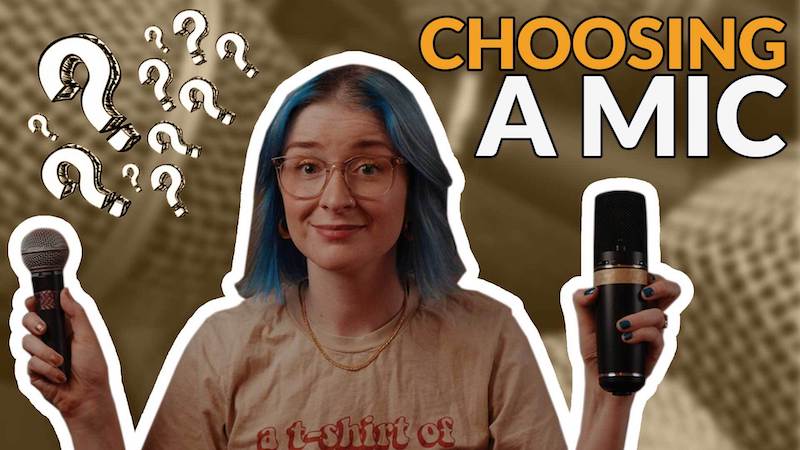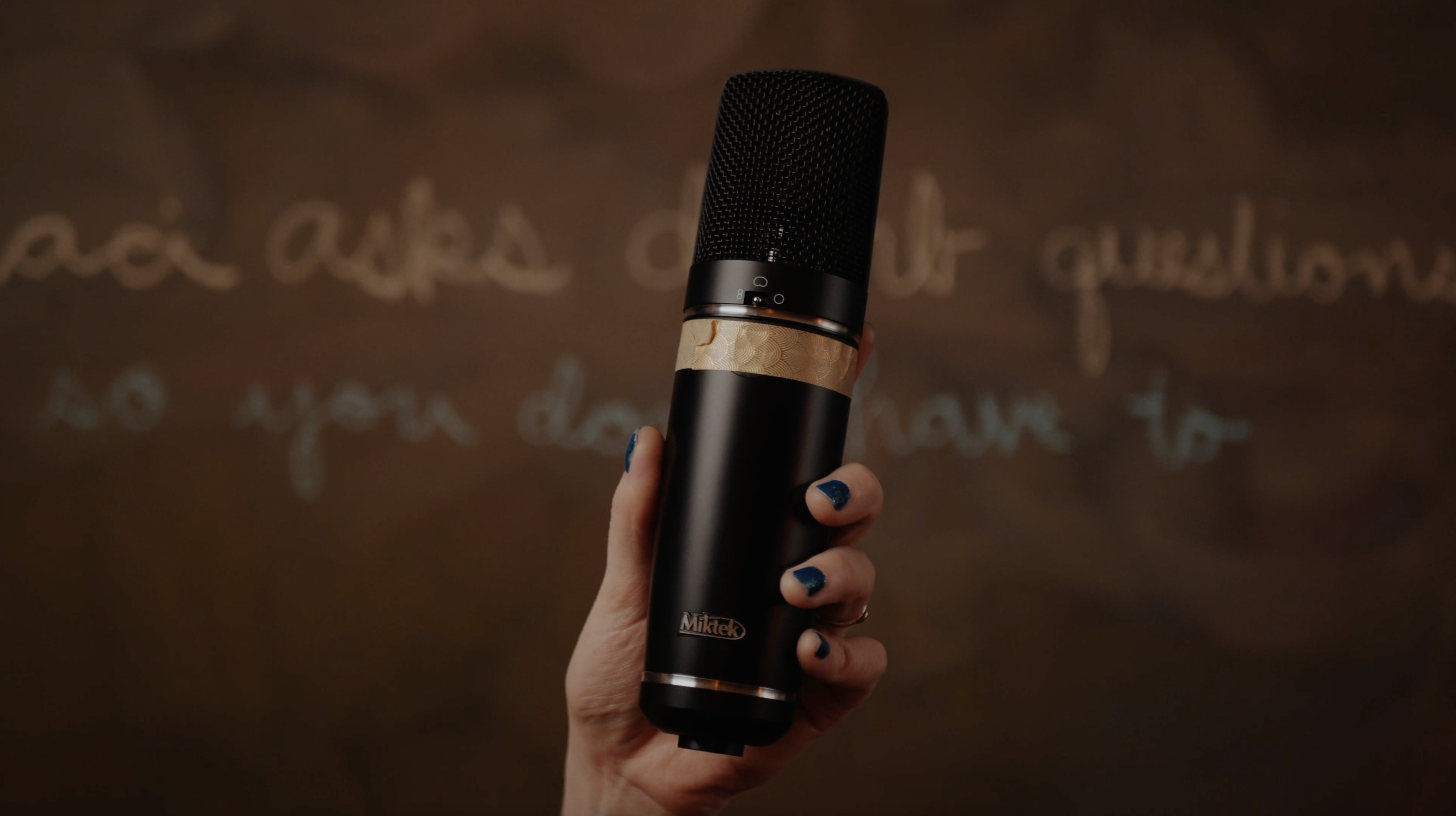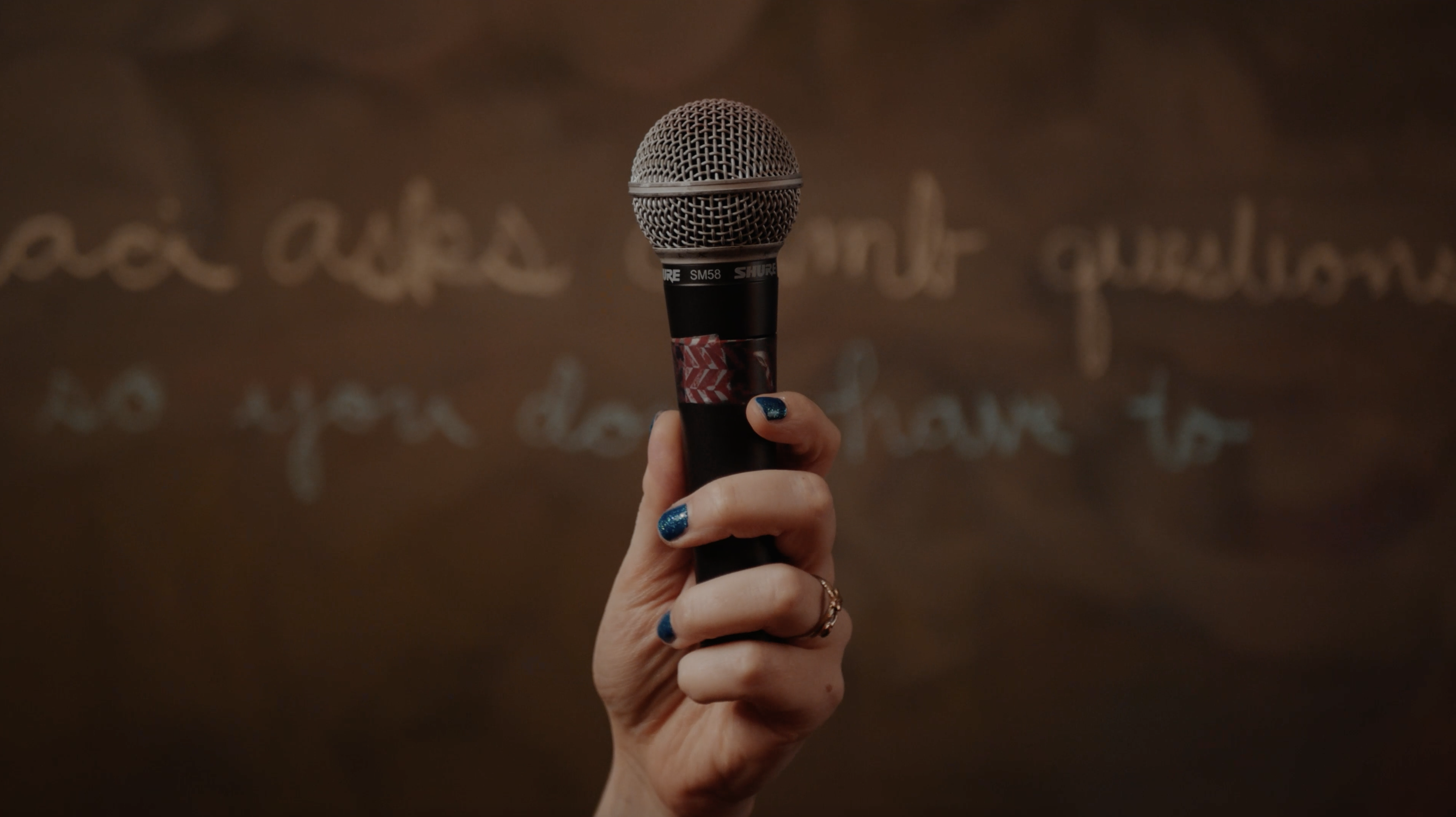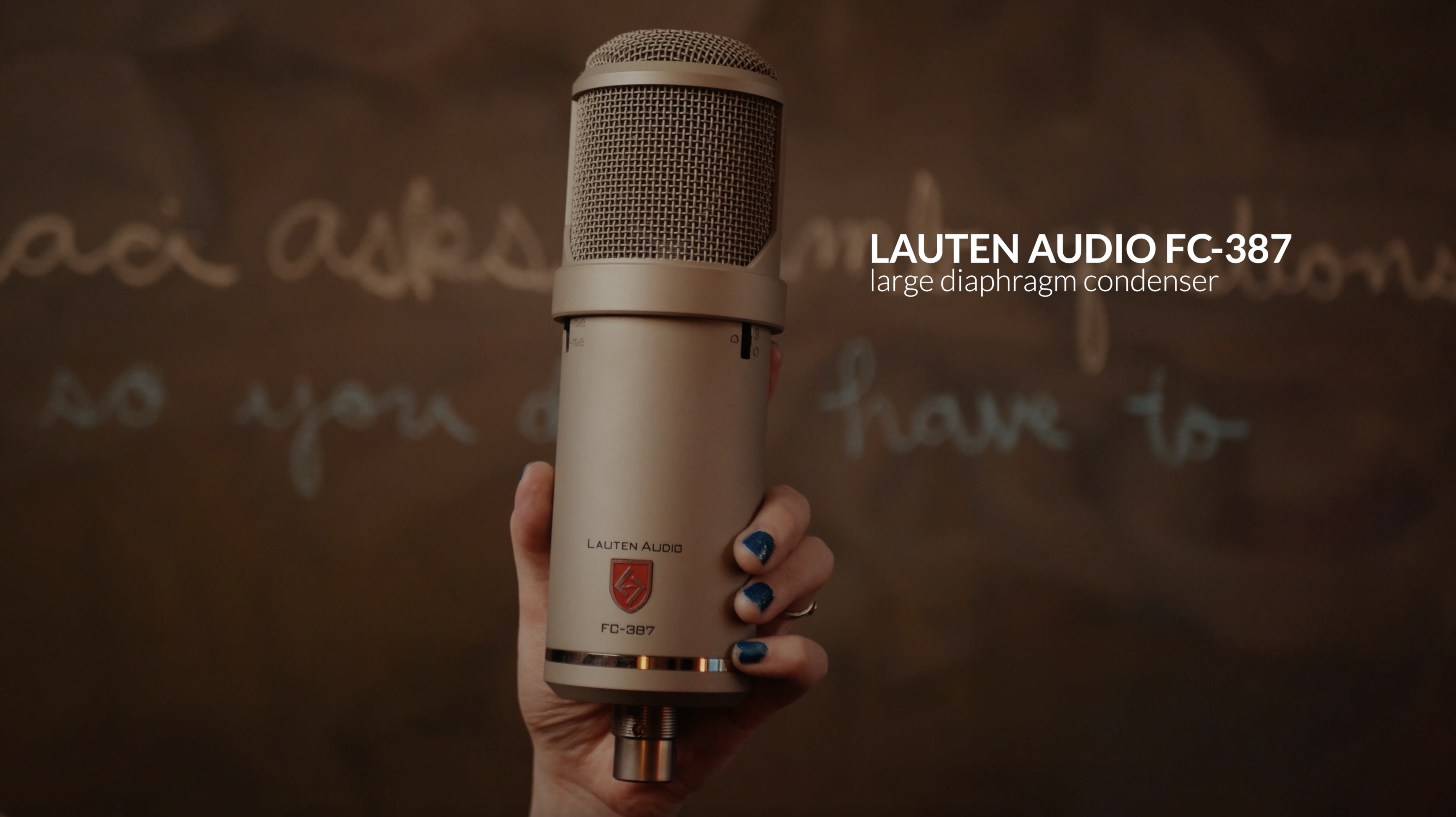How To Choose A Microphone – Graci Asks Dumb Questions (so you don’t have to!)
May 15th, 2022 by Graci Phillips
Quickly and easily deploy time-tested marketing campaigns with Indepreneur's INDIEPRO training library. Become an INDIEPRO member and learn how Indepreneur can help you break out of your current music scene, build a trackable fan base, and sell music and merchandise. Learn more now!
Hey, I’m Graci! I’m the full time community manager & director of indie success here at Indepreneur. A little bit of background on me: In the hours I don’t spend working, I spend working on my own music, doing session vocals from home, writing and recording commissioned songs, and generally having a human life! So, I stay busy. And a lot of that busy is music.
I’ve been releasing my own music since I was about 15. I grew up with musical parents, so I was lucky to grow up in studios, around music, and with a lot of musical support. The upside to that, is my first three projects were recorded with professionals in beautiful studios where I didn’t have to do much more than show up and play. But then, 2020 happened. And I was immediately faced with the arduous task of learning how to do all those amazing things myself. I do have amazing band mates, and we’ve been working with an awesome producer, but it’s time for me to learn some of this stuff for myself. I’ve had it too good for too long!
As an independent musician, writing and performing have always come naturally to me. But recording, marketing, touring, finances--all that? I’m a complete noob. Which is where the idea for this series came from. On pretty much a daily basis, I am finding dumb questions wandering through my head. Questions that I feel like I’m supposed to already know the answers to after pursuing music in earnest for a full decade. Questions that I assume my peers have known forever! It often leaves me sheepishly googling things or trying to figure out ways to ask questions that don’t make me sound like a helpless baby.
But, here’s the thing, that’s ridiculous.
I’m a badass singer, song-writer, multi-instrumentalist. My lack of technical knowledge doesn’t define my worth as an artist and it doesn’t define the worth of my art. And it’s okay that I don’t know everything! And, here’s a secret, it’s okay if you don’t know everything either. So, in this series we’ll be learning together. Answers to some of the most seemingly basic questions that can easily evade us!
This is a gatekeeping free zone.
This is a judgement free zone.
This is a place where dumb questions are welcomed and answered without pretentiousness.
And I’m very pumped about it.
So, this brings us to the first summit of Knowledge Mountain:
How To Choose A Microphone!

With all the recording I do at home, it’s kind of wild that I hadn’t explored this territory sooner. I should let you know at the top, I am not a gear buff. I have some equipment that I love, but I tend to keep it simple and if a tool does the job, I don’t spend too much time obsessing over it.
While I do quite a bit of recording at home, none of my personal music project is stuff I’ve recorded myself. None of my stuff on Spotify, for example. But I have a lot of videos on YouTube that I recorded myself! And I also do freelance work that requires me to record myself. So I’m not completely green. I know how to plug in a microphone and make it work, but in terms of expertise, I am the rookiest of rookies.
For the last few years I’ve recorded my session work and my commissioned writing with a MikTek MK300. Which costs around $300. It’s a good little workhorse mic that is totally suitable for my needs up to this point. It was definitely an upgrade to the first mic I purchased myself, which was a $46 USB condenser mic that I bought on Amazon (I couldn’t leave it plugged in too long because the audio would start lagging). So, it wasn’t quite ideal, but I wanted to start recording songs at home and I needed something to get me there. After that I spent $100 on another little mic, second hand, from a local music store, it wasn’t much of an upgrade. So moving up to the MikTek felt like a huge improvement! And it was an improvement in a ton of ways.
Earlier in 2020 when I realized I was going to be recording an EP and a full album (at least partially) at home, I knew it was time to upgrade to a nicer vocal mic. Which was incredibly intimidating! I only bought the MikTek because that’s what my bandmate owned and recommended. So I thought it made sense to get the same one so we had a pair. But I’ve never done the research myself to find my dream vocal mic that I can use on these next two projects and beyond. So that’s where this episode is starting. My quest to pick out a microphone.
And you’re coming with me--so let’s go!
If you google “how to pick a microphone” you are immediately accosted with an absolute wealth of information that you couldn’t pour through in an entire lifetime, much less an afternoon. Try to niche down to “how to pick a vocal, guitar, drum, etc. microphone” and you’re met with a more specific, but equally overwhelming amount of information. And if you’re green on recording theory and jargon (like me) it can really lose you. On that note, that’s really who this is for. Beginners. If you’re looking for something more technical on choosing a microphone, I promise you those guides are out there! But in this video we’ll be covering broad, overarching considerations for choosing a microphone.
For me, the vast amount of insane information on the internet was overwhelming and I couldn’t always figure out what applied to me and what didn’t.
So I decided to turn to people that I very much trust, all my badass, self recording and self producing, music friends. The reason I wanted to speak to these people, specifically, is because of their experience in this field. From working in (and even running) major studios, to self-recording and producing phenomenal music--these folks got the goods. Check out the bottom of this article for more information on the incredible artists and audio engineers that I spoke to for this research.
As I had all these conversations, I was pleasantly surprised that all these people, even with vastly different backgrounds and experiences in recording, and varied genres, all had very similar things to say on the subject of selecting a microphone. And from these conversations, it was actually pretty easy to determine a solid set of guidelines.
What kind of mic do you need?
So first thing’s first, know what kind of mic you’re looking for and establish your budget.
So, how do you know what kind of microphone you’re looking for? Well, that depends on what you’re using it for.

“If you’re looking for something for vocals in the studio, you’re probably going to want a large diaphragm condenser microphone. Maybe you want to mic a drum set live, you’re probably not going to want to use a large diaphragm condenser microphone, you might want to use dynamic mics. The main difference between the two, condenser microphones are going to be more sensitive and capture more nuance. Coming into it and understanding what you’re going to use it for will really inform which path you want to go down.”
- Jonah McLean, DUX
“If you’re looking to record guitar cabs or drums, one workhorse mic that you’ll want to have in your arsenal is something like a Shure SM57. It's a dynamic microphone. They work really good close up on sources; it's safe to use them on things like drums. They have a high transient spike. On the dynamic side for vocals a Shure SM58 is a performance microphone for vocals. You’ve definitely seen them on stages before. They’re not the ideal choice for recording studio vocals, however, you can get by with them. For vocal purposes a large diaphragm condenser microphone can perform very well. They’re the go to for tracking vocals. I also like small diaphragm condenser microphones for certain things; guitars, overhead mics for drums, etc.

Those provide a lot of clarity, but also you get the body of the instrument in a way that a dynamic mic would, wouldn’t without picking up a lot of room noise like a large diaphragm mic would.”
- Jack McCarthy, IndieX Agency Lead


How much money should you spend?
Once you know what kind of microphone you’re looking for, the next step is establishing your budget. As I’ve currently had a microphone that works just fine, I’ve had time to save up for a nicer mic! I’m prepared to spend up to $2,000 on a great vocal mic that I can use indefinitely. A few years ago, I wouldn’t have even been able to consider spending that kind of money on a microphone. Knowing I was going to be recording vocals for some of my own projects coming up, mixed with the free lance work I do, I decided it was a good investment for me. But does that mean we all have to spend thousands of dollars to get a good mic?
Absolutely not.

"It upsets me when people get stuck and think they can’t record because they can’t afford the gear. If you can afford to spend $200 I would recommend getting a bundle that comes with a shock mount, maybe a pop filter, and a microphone. There are tons of those kinds of bundles on Sweet Water. You don’t need to spend more than$ 200 to start and coast on that gear for a long time, or indefinitely."
- Michael Kessler, Kytoon
"There s a microphone called the Shure SM7B. A lot of people think, hey if I’m gonna record a vocal I need to spend $3,000 and get the Nemann really nice condenser microphone. And that’s gonna be great and certainly help, but this Shure SM7B has been very famously used on so many recordings. It was used early on by Michael Jackson. A lot of really popular and famous rapper used it and it’s like $300."
- Jonah McLean, DUX

"Other people use the Shure microphone all the time. Like the entire first Billie Eilish record was recorded on that. You really don’t have to look at price as a measure of quality. Because they are so different."
- Jillian Lavin, Spritely
"If you’re looking to get a little bit deeper into things and thinking about budget, I would say if you can spend between $200-$400 for a large diaphragm microphone, you’re going to get better quality out of that."
- Jack McCarthy, IndieX Agency Lead

We’ve established that a good range to aim for is $100-$500 to get set up with something that you can run with for a while. Which is pretty accessible? I mean if a $400 dollar microphone is good enough for Billie Eilish (that record is multi platinum, by the way) I think it could be good enough for a lot of people getting started with recording at home. But, we know that Billie's record didn’t go multi-platinum solely because of the mic she used. Obviously, your microphone is just one piece of the entire recording process! So, if we know that how much we spend/what mic we get is one small factor in picking out a mic, what are the other factors that we need to consider?
What else affects my recordings other than the microphone I’m recording into?

"You wanna learn about signal flow and gain staging early on when you’re trying to record. Know how hot should you record and how loud should the signal be coming in. And starting to listen to what things sound like a little more actively. So listen to "what does my voice sounds like in this spot. Would it sound better if i go over there in the corner? I could closet myself up and record in there.""
- Jack McCarthy, IndieX Agency Lead
"An interface is probably the most important, maybe even more so than the microphone! It’ll give you a much more accurate picture of what you’re actually recording. Some of those USB microphones that are a little more budget friendly might not do as good of a job at that. For anyone watching that’s just kind of starting and is looking to run out and get something--if you can wait a little bit and save up and find a cheap interface to get and then get your microphone, that’s a really good bet."
- Jonah McLean, DUX

"Especially when you’re first building your setup, I think it is much more important to understand your vocal chain and processing in the computer than it is to pick your microphone. Because, when I first had my microphone I recorded it and i was like, "Why is this so quiet and sounds like crap? This is a $1,100 microphone, I don’t understand." That’s because I didn’t get that you need proper input gain, you need a compressor, you need EQ. Without that, this beautiful mic that I use all the time sounds like ass."
- Jillian Lavin, Spritely
"There's a lot of steps in vocal processing that not everybody needs to take, but if, for instance, you want super polished sounding, super clean, decipherable vocals, it has little to do with the microphone and almost everything to do with the way you mix it. For people who are disparaging over unprofessional sounding vocals, it’s probably not your microphone, unless you’re recording into a Rock Band microphone."
- Michael Kessler, Kytoon

Okay. So we now have a baseline for what type of mic we’ll need, what we can consider for our budget, and what other elements factor into recording and mixing and producing recordings on any mic. I don’t know about you, but as I had these conversations I felt less and less stressed about finding the “perfect microphone.”
With so many other factors playing into it, knowing that incredible artists get phenomenal performances on budget friendly mics--it just made me excited to start learning more about the recording process, regardless of what mic I’m using.
As an independent artist I can often get caught up in analysis paralysis. When it’s all on me to make a big decision, like buying a new microphone, sometimes it feels like I’m going to mess up so I don’t make a decision at all. And that makes it really hard to accomplish things.
How do I know if I’m ready to get started?
"A major thing I feel like I’ve had to unlearn is those standards that there is a "right" thing to do. There is a "right way to file transfer. There’s a "right" kind of mic to use and "right" technique to use. I feel like, at first, I was surrounded by a lot of audio engineer snobbiness. Like, “...get this pre-amp and file conversion...you need to not lose audio quality and data transfer...” and I’m just like, get it from point A to B. Does it sound the same to you? Cool. You’re going to mess it up anyway! You’re going to put it through a low-fi filter anyway! You’re going to make it sound like tape on purpose! It doesn’t matter, all these standards are BS. If it sounds good to you, then do it."
- Jillian Lavin, Spritely
"Recording can be intimidating, I think, for many people. But once you crack into it and start to learn it and get that experience, it really demystifies it. Don’t feel like you need to have loads of money to get started. Don’t over think it."
- Jonah McLean, DUX


"I actually started with a Rock Band microphone, like from the video game Rock Band! Initially, I was just taking a series of extension cables to get it to fit into my 8ml mic jack on my Gateway PC. I would plug things into that. But I had a Rock Band microphone for a long time! Basically, I’m saying all this to say, I was averse to figuring this out, but needed to make music. So I was very ramshackle about everything for a long time and I feel like only recently have I gotten at all savvy about it."
- Jesse Gillenwalters, Basic Printer
"I went to Guitar Center and said I wanted to record vocals and guitar. I spent like $200 and some random clerk there told me what to buy. I used all that, exclusively, for like 5 years. And then a couple years ago I upgraded to a better microphone. But I couldn’t even point to where I transitioned, because sonically, the difference is negligible. It was 7 times more expensive, and it does sound better with less work, but it’s marginal. I still don’t think anybody needs to spend that much on a microphone."
- Michael Kessler, Kytoon

Okay, so let’s recap.
While there are certainly technical elements to choosing a microphone, setting up your recording space, and actually recording--my big takeaway here is that it takes time to learn these things. It takes time, dedication, and likely a lot of trial and error learning how to record. Whether it’s vocals or instruments, more important than spending a big budget and buying the most expensive, fancy, professional gear possible, is buying some solid equipment that is right for your budget and your purposes and spending time learning with those tools.
So, let me show you what I landed on and what I purchased.
This is my Lauten Audio Atlantis FC-387 Large-Diaphragm Condenser Microphone that I purchased from Sweet Water for about $1800.

Why did I choose this mic?
Well, I had a lot of help! I talked to friends, I borrowed mics to test out, I sang into friends mics, I talked to producers, and I even sent a recording of my voice to a Sweet Water rep who sent me this recommendation.
Do I feel confident that I explored every single option and picked the ultimate microphone?
Nope!
But what I do know is that my voice sounds beautiful on this microphone, I love it, and this is a microphone that I will use for years to come. I used this mic on my most recent recordings and I love the way my voice sounds on it.
And guess what? Even though this is an expensive microphone, especially compared to my $46 USB mic that I started with--I still recorded it with my cheap interface, into a stolen version of Logic Pro, onto a 2016 mac, in my living room. And I think it sounds phenomenal.
Not because the mic was expensive, but because I was working with great people who knew what they were doing. I have a lot to learn, but I’m excited to learn it.
How can I be sure I won’t mess up?

"The most important thing that you can do when it comes to recording your music is get your performance tight. No microphone in the world can make a terrible sounding vocal sound good. That goes so often overlooked."
- Jack McCarthy, IndieX Agency Lead
"If you were like "I wanna start making music." I would say, immediately get the cheapest thing within reason and just start and learn."
-Jesse Gillenwalters, Basic Printer

"If you have friends that have mics that you can go over to their house, try it out, have them show you their vocal chain, see if you like the way your voice sounds, or if you could borrow the mic, do that. If you don’t have anything like that, you can start with something very standard like the SM7B. Your vocal chain [is important], don’t expect it to sound good when you plug it right in. Use the tool you have available and just start throwing stuff at the computer. Don’t hold yourself to too high of a standard, just make things. If they sound good, they sound good. Don’t feel like there’s too much of a barrier to entry, because there’s not."
-Jillian Lavin, Spritely
There is no such thing as gatekeeping when it comes to recording music anymore.
Back in the day, the average independent artist couldn’t afford to record in a studio without a record label backing them. But today, multi-platinum albums are recorded on $400 microphones in bedrooms.
So believe me when I say, you can do this.
Find what’s right for you for today. You don’t have to find the "perfect" gear. You just have to find something that works for you right now. You can always upgrade down the road as you learn and understand what you want in your gear.
Making music is more important than finding the perfect gear.
Making music is more important than buying the most expensive gear.
The YouTube covers I recorded on that $46 dollar Amazon mic have some of the highest views of all my videos. Not because the sound quality is pristine or perfectly balanced, heck, it’s not even mixed at all, but the music resonates with people. That is what is important. Making music that you love and are proud of and sharing it with others.
I hope you learned as much as I did in this first chapter of Graci Asks Stupid Questions (so you don’t have to!)! I’m excited to ask more "stupid" questions and get answers that we’re all looking for.
So, what should I ask next? Hit the link below to let me know!
Truly, there are no stupid questions. So let’s crush gatekeepers, snobs, and pretentious jerks--creative good vibes only.
We’re all learning, so let’s do it together.
FRIENDSPERTS (FRIENDS + EXPERTS) IN THIS EPISODE:
🌟Jack McCarthy, Agency Lead at IndieX Marketing Agency
🌟Jonah McLean of DUX
🌟Jillian Lavin of Spritely
🌟Michael Kessler of Kytoon
🌟Jesse Gillenwalters of Basic Printer
Have a suggestion for Graci Asks Dumb Questions?
Let me know here!

About the author:
Graci Phillips is Indepreneur's Community Manager & Director of Indie Success. Graci is part of our Nashville team and specializes in providing resources and solutions to our members, community building, and highlighting success stories within this incredible community.
If you aren't yet part of our Indie Community, you can get access to our entire library of music business trainings, our entire suite of exclusive discounts on partner products and services for musicians, our 4000+ private community of Indies, and weekly live stream Q&A's and coaching calls by signing up for INDIEPRO!
Just click below to join for a $1, 30-day trial and see what all the fuss is about 

